Meet our Students
Curious about what life as a grad student in our group is like? Here are some interviews with students: Kayla, Kenny, Autumn, Christina, and Nick.
An Interview with Kayla Schang
What year are you and where did you go to undergraduate?
I’m a first-year student. For undergrad, I completed a Physics major with Astronomy emphasis and music and math minors and graduated with a B.A. in Physics in Spring 2021.
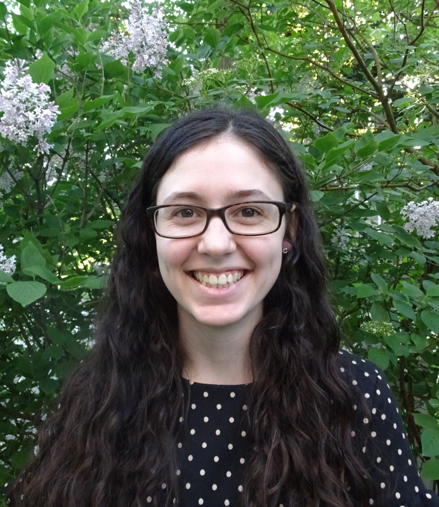
Describe your line of work in planetary science in non-technical terms.
I currently study regolith and dust in the solar system, especially the properties of lunar regolith. Regolith is the layer of unconsolidated rock and soil material on a planet, moon, or asteroid. I like to describe it as space dirt, except we can’t call it dirt because that might imply biological material. I currently work on the Strata projects with my advisor, Dr. Addie Dove, to study regolith. Strata 1 is where tubes of regolith and regolith-like materials flew on the ISS — my job is to use code to process the video data from that experiment. Strata 2P is where similar tubes of regolith-like material flew on a parabolic flight (a.k.a. the flights where people get to experience less gravity and go floating in the air!) For Strata 2P, I helped with the experiment setup and actually flew on the parabolic flight in December 2021.
What made you decide on UCF for grad school?
When thinking back about what I liked most from my previous classwork and internships when I was an undergrad, I realized that I was most excited about astronomy which focuses on the solar system. It is still really neat to be able to see far away objects through a telescope but being able to study objects that humans or human-created technology have visited just seemed particularly exciting! Since we are limited by the laws of physics, this mostly only applies to solar system objects. This led me to look for graduate programs that offered a specific planetary science program, and ideally ones that had some connections to missions. Since planetary science is a broad field, it was also helpful to find a physics-based graduate program like the one at UCF to match what I had learned while doing the physics major.
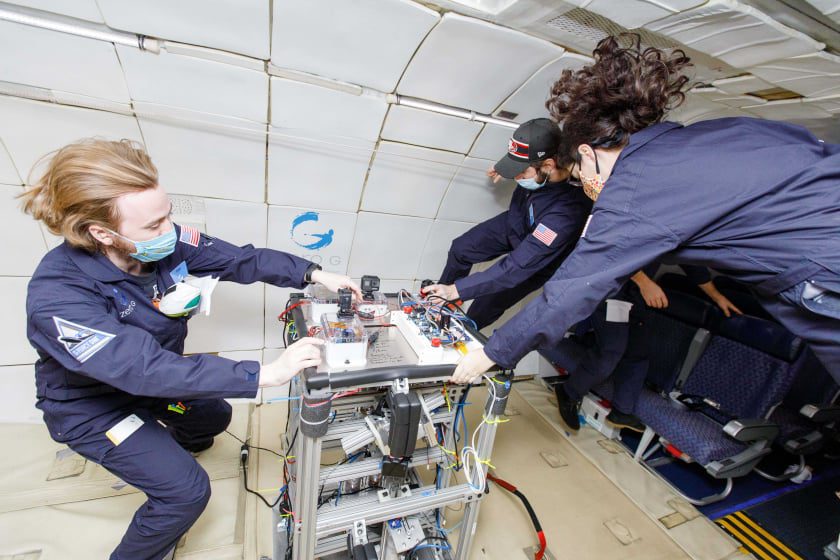
Talk about your best experience so far.
By far my best experience was being invited to fly on the Strata 2P parabolic flight with Zero-G in December. While completing flight projects is always stressful, it was a great way to get to know other people connected to the project, and of course, the flight itself is unforgettable!
What about Orlando itself — what’s best about living here?
Coming from Wisconsin, and doing undergrad in the equally-cold Minnesota, I was very apprehensive about living someplace that is so warm and humid for so much of the year. But, I do have to admit there are benefits, and it is certainly nice to not have to bundle up every time you go outside (especially if you have a dog to walk!) and definitely a bonus to be able to go to the beach virtually year-round.
How about life as a grad student — what adjustments have you had to make?
I feel like I actually went the opposite way as most students. In undergrad, I was definitely over-committed and over-stressed in a way that I quickly learned was not going to be sustainable for another 4-6 years in grad school. But, while I got the hang of not over-committing pretty quickly here, it has been much harder to re-evaluate how I work best to make sure I am still productive even though my days aren’t as packed as they used to be.
What are you plans for after graduate school?
I am definitely most interested in finding a way to be involved with the science side of missions, whether that means working directly at NASA or working at many of the other research companies that become involved in missions.
Do you have some insight about what it takes to succeed in grad school?
While I think it is always good to take a step back and review your time management techniques, study tools, and the classic things listed in school advice articles, find a way to make sure you aren’t losing the big picture of what you are trying to work on along the way. For example, it is great to read a wide variety of articles when you start off learning about a new topic, but how will you make sure you are connecting it back to your research or even just retaining the knowledge in a long-term way? Making sure you have an organizational system that can be your ‘second brain’ will be even more important in grad school, where everything needs to eventually tie into your thesis, than in undergrad where classes were the focus.
Is there some advice you can pass on specifically to new graduate students?
First, try to find students in your classes who you can do work with, or at the very least make some group chats! It can be intimidating to work with others, but finding a good match for a study-buddy means you both can practice ‘teaching’ the material to the other, you learn new ways of problem-solving that you may not have discovered on your own, and generally come out with a better understanding of the concepts aside from just being able to complete the homework questions. Setting this foundation now will also make it more natural to ask for help with future research questions when it comes time!
An Interview with Kenny Gordon
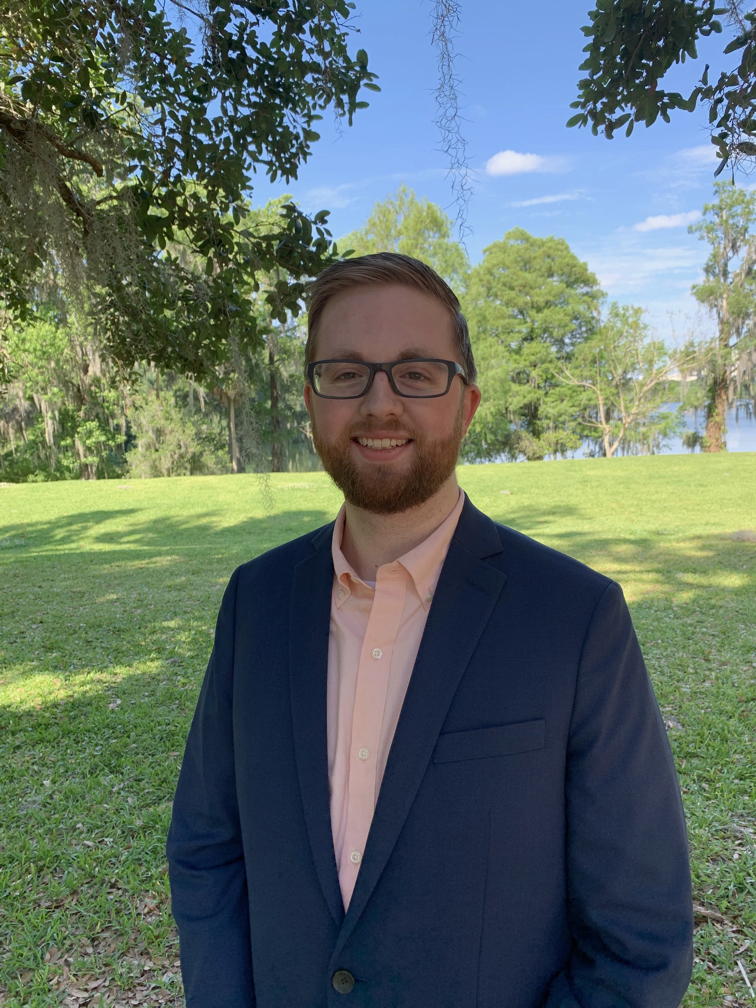
What year are you and where did you go to undergraduate?
As of August 2022 I am entering my 4th year here at UCF. I got my B.S. in Physics with minors in Astronomy and Mathematics from James Madison University in May 2017.
Describe your line of work in planetary science in non-technical terms.
I am a theoretical astrophysicist who studies exoplanets. Basically, I use computer programming to simulate how different atmospheric and surface (if present) properties of an exoplanet affect the polarization of the light that it reflects or emits. I recently finished my PhD candidacy project, which involved using spacecraft data to model the Earth as an exoplanet, running the exoplanet-Earth data
through two separate polarized radiative transfer codes, and comparing the resulting output spectra to each other and to observations of the linear polarization of the Earthshine, in an attempt to better constrain theoretical models of terrestrial exoplanets. My current and future research will expand upon these results by simulating additional terrestrial planets, some gaseous planets, and potentially some exomoons, as well as theoretically evaluating the performances of various astrophysical instruments used to observe and characterize these worlds.
What made you decide on UCF for grad school?
I knew I wanted to study and characterize exoplanets, so I looked into a bunch of different Astronomy, Astrophysics, and Planetary Science programs. UCF was listed among the top growing departments for planetary science, and when I looked into the research offered here, I was thrilled to see that Dr. Karalidi had just joined the department. Her expertise on exoplanet and brown dwarf modeling really intrigued me, and I was fortunate enough to be able to discuss her research more over the phone. I also really liked how even though UCF is one of the largest campuses in the country, the Planetary Sciences Group is the perfect size. Everyone seemed to know each other well, and the friendliness and camaraderie that was displayed when I visited really sealed the deal.
Talk about your best experience so far.
During the first week of May 2022, I got to attend and present a poster on my candidacy project at the Exoplanets IV conference in Las Vegas, Nevada, which was my first ever in-person international conference. Because of the COVID-19 pandemic, this was the first time I was able to meet some of my collaborators in person after working virtually with them for 2+ years! While I was there, I got to explore Las Vegas (my first time ever!) and I was able to meet and talk with individuals from all over the world during all of the breaks, poster sessions, and evenings. It was a great experience to be able to share research and learn about what so many other exoplanet scientists are working on!
What about Orlando itself — what’s best about living here?
I think the location is the best part of living near UCF. I have always been a huge Disney and Harry Potter fan, so being less than an hour from both Disney World and Universal is a huge plus for me. But aside from the theme parks, you also have easy access to downtown/city life for bars and other night life, Kennedy Space Center and the rest of the space coast where you can view live launches, and tons of beaches (Cocoa is my favorite) to relax at! There are tons of places to explore in this area.
How about life as a grad student — what adjustments have you had to make?
The hardest adjustment that I have had to make was re-evaluating my priorities when it comes to my free time. Before returning to academia, I worked a full-time job as a systems engineer for the government for about a year and a half. I would work my 40 hours a week, 5 days a week, but then have all of my evenings and weekends to myself. Grad school on the other hand is a little more demanding, and in addition to my classes during the day I have studying and research, which takes away from some of my personal time during weekends or nights. However, I still make time to relax, hang out with friends, and have fun!
What are your plans for after graduate school?
I intend to continue my exoplanet research at a space organization, either government or private industry, but preferably at a NASA center. Having previously worked (as a student employee) at a Planetarium, I would also like to be involved in or even set up some outreach programs where I can continue to share my love of astronomy with the community and hopefully get more kids involved in and passionate about the STEM fields.
Do you have some insight about what it takes to succeed in grad school?
Perseverance and time-management are probably the two most important aspects for success in grad school. There will definitely be periods of ups and downs in every semester, and sometimes work might come in waves where you might have no assignments due one week but then a ton of assignments due the next week. Just stick to it, push through, and you will come out better in the end. Find the balance between research, coursework, and personal life, and you will do fine.
Is there some advice you can pass on specifically to new graduate students?
Keep yourself organized, and definitely stay on top of tasks! I have an agenda book where I lay out what assignments are due when, and I keep notes to myself about certain tasks. Make friends with the other students in your cohort, and work/study together for classes as much as possible. Also, do not be afraid to ask questions or to ask for help! No one will ever think less of you, and in fact, your other classmates more than likely have the same questions!
An Interview with Autumn Shackelford
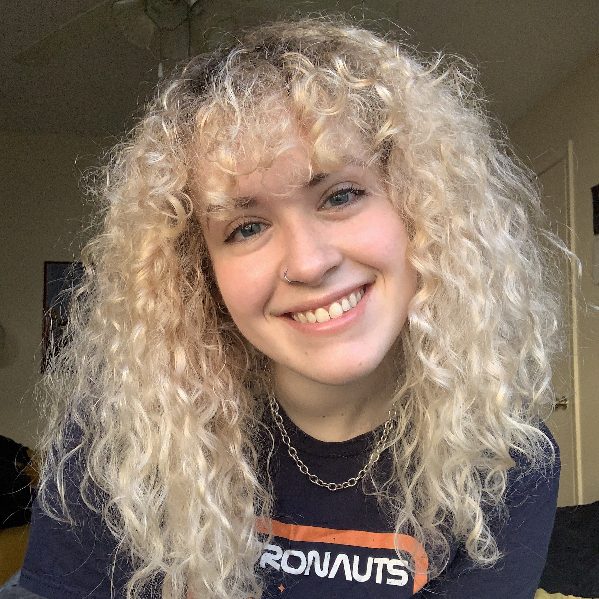
What year are you and where did you go to undergraduate?
I’m a second, almost third year student. I got my B.S. in Physics with concentrations in Astrophysics and Optics at the University of Alabama in Huntsville in 2020.
Describe your line of work in planetary science in non-technical terms.
I try to mimic conditions on planetary bodies without atmospheres like the Moon so that I can study the regolith, or soils, present on those bodies. I also use spectroscopy, or the study of how light is absorbed or emitted by matter, to characterize the surfaces of other planets, i.e., to see what minerals may be present there. Studying what other planetary surfaces are made of allows us to have some pretty direct insight into how these planets formed and changed over time, which is super cool!
What made you decide on UCF for grad school?
The research being done here perfectly aligned with my interests. Orlando is also a really fun area, with tons of great food, culture, and other attractions. There’s always something new to check out, so I’m never bored!
Talk about your best experience so far.
In March of 2022, I got to attend the Lunar and Planetary Science Conference just outside of Houston, Texas. When you attend conferences to present your research, you finally get to meet the people whose papers you have been reading and relying on for years. You also get to make friends with other grad students that will one day be working alongside you in the field. I had so many awesome conversations with people my age about research projects, mission concepts, and more. It’s great and really energizing to have those kinds of experiences in planetary science. You get so inspired!
What about Orlando itself — what’s best about living here?
The weather here really facilities outdoor activities all year long! The beach is about an hour away, too, so if you want to escape for a weekend, it’s pretty easy to do so. The variety of restaurants and other local businesses here is amazing, too. You can find almost anything you want and can support people along the way!
How about life as a grad student — what adjustments have you had to make?
Learning how to set goals and make reasonable expectations for myself has been really important. When you’re doing research, sometimes it’s hard to realize how many tiny steps make up the big picture that is your project. In undergrad, you have deadlines for almost everything, but in grad school, you often have to make benchmarks for yourself.
What are you plans for after graduate school?
I’d love to apply to a postdoc with DLR in Germany so that I can work on BepiColombo when it reaches Mercury! Becoming a professor or science communicator is my ultimate goal. I really want to share the importance of planetary science and physics with people who don’t study it for a living.
Do you have some insight about what it takes to succeed in grad school?
Never be afraid to ask questions or admit that you’re wrong! Sometimes, it’s easy to feel like you aren’t as smart or aren’t as good as everyone else if you don’t understand something right away, and that might make you want to pretend like you understand something when you really don’t. If you have a question about something, it’s extremely likely that your colleagues have the same question, especially in your coursework. So: Ask away! Science is all about asking questions, anyway. ?
Is there some advice you can pass on specifically to new graduate students?
Keep a planner! At the beginning of every semester, I make a research calendar so I know what I need to accomplish by what date, and I make note of whether I met the goals I set for myself or not. It helps you learn how you work and how long it takes you to do certain things. (Plus, if you’re prone to procrastination, it helps keep you accountable!)
An Interview with Christina Moraitis
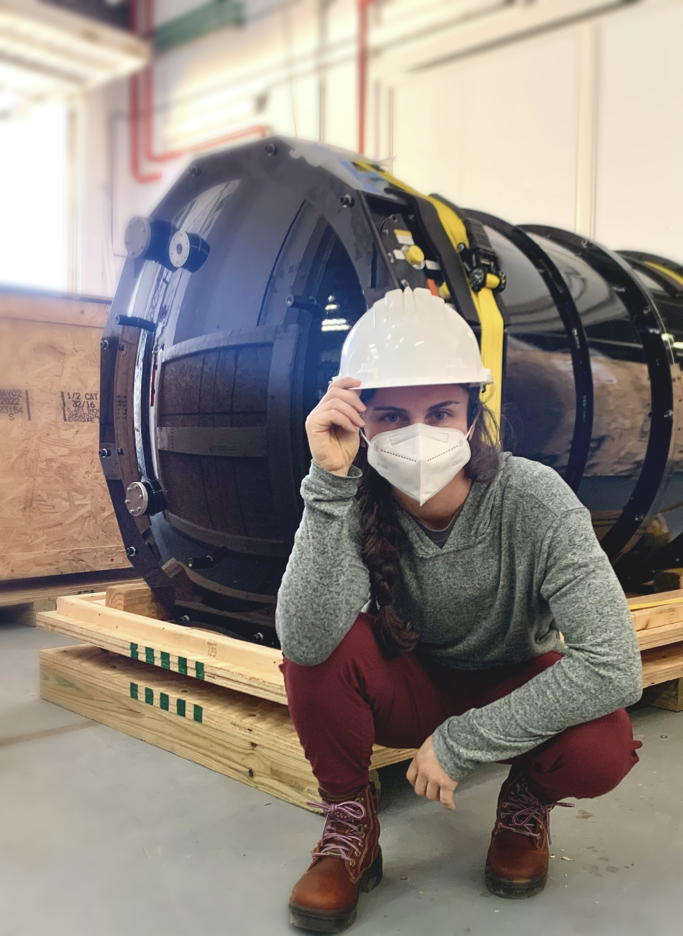
What year are you and where did you go to undergraduate?
I am a fourth-year graduate student overall, but this is my second year at UCF. I did my undergraduate degree in Physics at Samford University and completed my Masters in Astronomy at University of Florida.
Describe your line of work in planetary science in non-technical terms.
My main research focus lies with astronomical instrumentation. I like building instruments that we use to study planetary science and astrophysical objects. I am currently working on a ground-based telescope, OPA (yes, like the Greek saying!), that takes several small, commercial-off-the-shelf telescopes and combines them into a large area equivalent by using optical fibers to combine each telescopes’ light. We will use OPA to observe M-dwarf flares in search of coronal mass ejections (very large flares) and understand how those potentially catastrophic flares may affect planetary atmospheres of planets that orbit these flaring stars, and, in turn, affect how life may or may not be developing on these distant worlds.
What made you decide on UCF for grad school?
I chose to transfer to UCF to pursue instrumentation research intertwined with astronomical observation with Dr. Steve Eikenberry.
Talk about your best experience so far.
My best experience thus far was being a part of the commissioning team for the MIRADAS spectrograph at the Gran Telescopio Canarias in the Canary Islands. It was wild being above the clouds at one of the best astronomical observation sites in the world. One night, we hiked 5 miles up to the top of the volcano to take astrophotography photos around 1am. We were not allowed to have lights on near the telescopes, so we only had the light from the milky way illuminating our path. It was truly beyond words.
What about Orlando itself — what’s best about living here?
There’s a whole lot to do in Orlando. From the amusement parks to some pretty fire restaurants, it’s easy to stay entertained. The beach is not too far away either (45 mins), so that’s also a bonus.
How about life as a grad student — what adjustments have you had to make?
Life as a grad student is all about learning how to manage your time and stay organized. Some years, you may have to juggle research, grad classes and teaching all at once. It’s quite challenging at first, but you learn to spread your time out adequately to ease the stress. Transitioning from undergrad to grad life is a massive change. It is very hard to get used to but you will.
What are you plans for after graduate school?
I’d like to pursue work on space-based instrumentation for major NASA telescopes such as LUVOIR, or interplanetary missions that travel far beyond Earth. Being a long-term space mission sounds absolutely thrilling.
Do you have some insight about what it takes to succeed in grad school?
Succeeding in grad school is all about keeping intrinsic motivation and learning to motivate yourself every week. If you aren’t self-motivated to learn or perform your research, simply for the love of the subject and inherent curiosity, you will probably struggle to complete the degree. No one is going to go above and beyond to whip you into shape- you must find the drive to do it yourself! You can do it!
Is there some advice you can pass on specifically to new graduate students?
The best advice I can give to anyone pursuing a long degree, like so, is to find what you are passionate about OUTSIDE of science and make time to pursue that. Allow yourself to take breaks and spend time with friends or doing a hobby that you enjoy. Give your time to things outside of your research. Build a healthy and good life outside of your degree field and stay well rounded! Taking a break is an important part of being productive. Research wise- Go to as many conferences as you can, surround yourself with people that encourage you to keep going, and stay humble ?
An Interview with Nick Piskurich
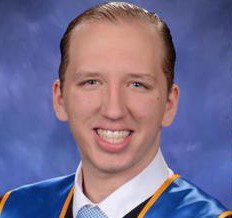
What year are you and where did you go to undergraduate?
I am just about to start my third year in the program in the Fall of 2022. I received a B.S. in Environmental Engineering from the University of Notre Dame in 2019. Go Irish!
Describe your line of work in planetary science in non-technical terms.
I am a planetary geologist, and I try to understand the materials (rocks, minerals) that make up the surfaces of planets / airless bodies and determine the large-scale geologic processes that formed these deposits that we see on planets’ surfaces. In particular, I use spectroscopic datasets, which tell us information about how light interacts with the surfaces of planetary bodies. The way that light is absorbed, scattered, or emitted is related to the mineralogy of the surface. My current candidacy project involves studying strange features on the Moon known as irregular mare patches, which could be the result of volcanic processes very late in lunar history. To understand their compositions, I use datasets from several spacecraft that have orbited the Moon in the past decade or more. A typical day for me involves using image analysis, mapping, and coding software that helps me to select regions nearby these patches to better understand their compositions. Determining the materials that make up the Moon’s surface and the processes that formed these surfaces is important for understanding the evolution of the Earth-Moon system and our solar system. Earth’s nearest neighbor holds a lot of valuable information: all you have to do is take a closer look!
What made you decide on UCF for grad school?
Deciding on grad schools was a bit challenging for me, but ultimately, I came to UCF because of my shared research interests with my advisor, Dr. Donaldson Hanna, as well as the proximity of UCF to some of my family. Orlando is also home to many hidden gems in terms of food and attractions. I have been here for almost two years now and am still discovering new places for outdoor activities and yummy bites.
Talk about your best experience so far.
This past July, I had the opportunity to attend the NASA Exploration Science Forum and Lunar Graduate Conference in Boulder, Colorado. This was my first in-person conference ever, and after several years of pandemic and Zoom burnout, it was awesome to meet collaborators, peers, and mentors who gave me valuable feedback on my project. It was also a great opportunity to hear about the diverse research topics in planetary geology and science as well as get exposure to some of the upcoming NASA missions relevant to my own research interests. Finally, I made friends with graduate students from other institutions, and we had the chance to explore CU Boulder’s campus, nearby eateries, and attractions, which turned out to be one of my favorite experiences of the whole summer!
What about Orlando itself — what’s best about living here?
Surprisingly, it has to be the food. I was not anticipating how many amazing and innovative restaurants and bakeries there are in the general Orlando area. Some of the best places I have found along the way include Chi-Kin, which dishes out some delicious Korean fried chicken and waffle fries, and Gideon’s bakehouse, which sells behemoth half-pound cookies that will keep you coming back for more. I am also a huge Star Wars and Harry Potter fan, and there are more than enough attractions at Disney to keep you entertained with lightsabers, wands, and everything in between.
How about life as a grad student — what adjustments have you had to make?
While undergraduate life was certainly full of many challenges, grad school forces you to become comfortable with failure, even if it is from day-to-day tasks or something more long-term. When collecting and analyzing data or learning a new technique, you are constantly learning things on the fly, and you have to learn to show yourself grace and be prepared to make mistakes, sometimes repeating the same ones over and over again. I have tried my best to learn and apply patience and perseverance to my everyday research tasks, and grad school is about continuing to adapt to these constantly changing situations. The other thing is time management and holding yourself accountable for reaching short-term and long-term project goals. Undergrad classes were filled with deadlines for everything, but grad school involves more self-imposed deadlines and goals to meet.
What are you plans for after graduate school?
I would like to work at a NASA center and get involved in mission planning / architecture by using the scientific background from my grad school projects. Several classes here at UCF have exposed me to the planning missions and drafting mission proposals, and to me, that would be an exciting challenge and fulfilling endeavor to be a part of the next-generation scientists looking to explore the Moon and beyond!
Do you have some insight about what it takes to succeed in grad school?
I think sometimes you have to be honest with yourself about your knowledge and work limitations. It is okay to admit to yourself, your advisor, class professor, or colleagues that you are wrong about something or that you may need help with something. While your degree will only have one name on it, it is the result of a lot of help and guidance from others and your willingness to go to others for insight. So don’t be afraid to go to others for assistance, because it will likely end up paying huge dividends in the classroom or for your research project. Also, you should be honest with yourself about how many hours you can put in each day and set firm limits on work hours vs. free time hours. Your brain will thank you!
Is there some advice you can pass on specifically to new graduate students?
The biggest thing is probably to do your best not to fall victim to imposter syndrome. It is the most pervasive characteristic of people in academia. Whenever you compare yourself to others’ progress, it is usually to your own detriment. Focusing on your own goals and progress will help to improve your mental health and outlook. Another thing I would say is that you should find a work schedule that optimizes your output. Grad school is filled with a lot of unstructured free time, so try to find the best work hours and make a routine out of it while keeping in mind that you should set aside free time that you want.
